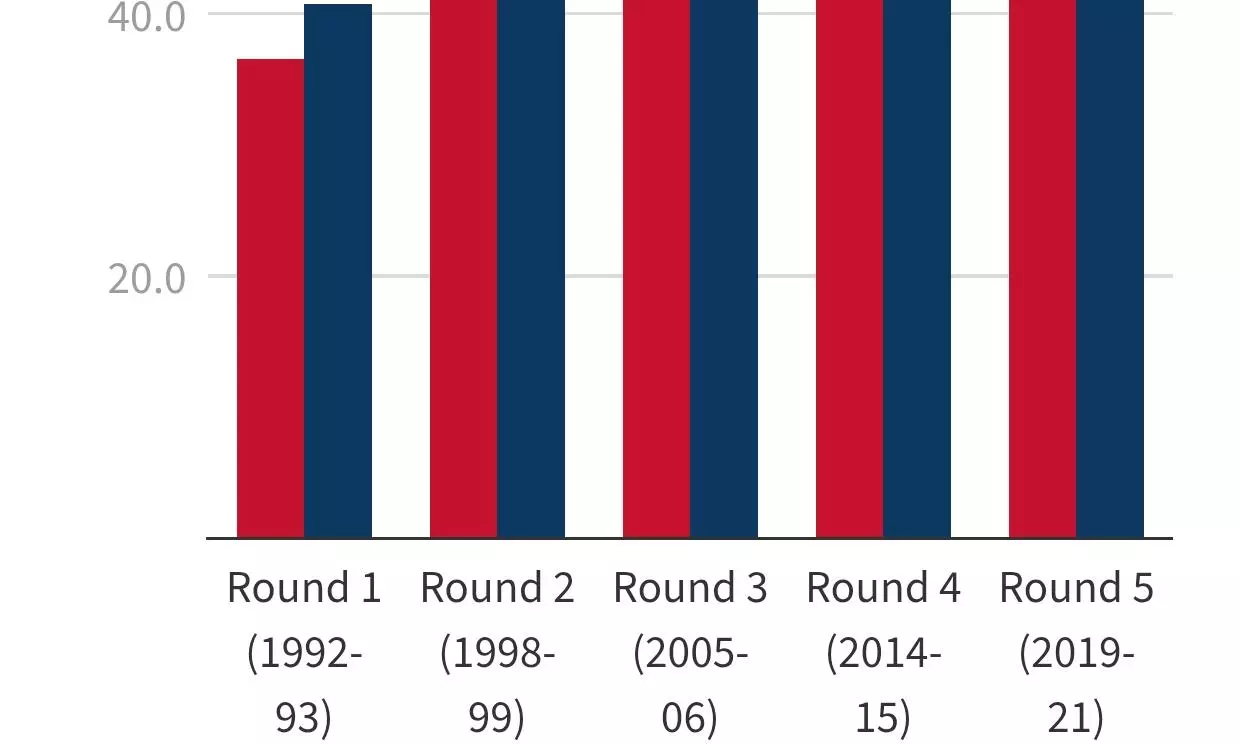
Hyderabad: Family planning trends in Telangana reveal a disproportionate burden on women, with a heavy reliance on female sterilisation, a widely used method of contraception.
According to data from National Family Health Survey (NFHS)-5, around 57.2 per cent of married women aged between 15 and 49 use various family planning methods, with female sterilisation emerging as the most common form.
As part of its family planning measure, the government provides temporary and permanent solutions to the people. Men and women are counselled on the use of condoms, oral contraceptive pills, injectable contraceptives like antara injections and intrauterine contraceptive device (IUCD) such as Copper-T.
“These are outpatient procedures. Counselling about such temporary contraceptive measures is done by ASHA workers or at the level of PHCs and CHCs,” said Dr. Swapna from RIMS, Adilabad.
For permanent contraception, women have options like tubectomies and double puncture laparoscopy (DPL), while men undergo vasectomies.
According to data from the district level household and facility survey (DLHS)-4, the overall percentage of individuals using any form of contraception is 61.8 per cent. Female sterilisation accounts for 57.1 per cent, while male sterilisation is at a very low three per cent.
Among the districts, Warangal has the highest contraceptive usage at 70.9 per cent, while it is 65 per cent in Hyderabad. Approximately, 58.7% of women undergo female sterilisation in Warangal, compared to 63.2% in Hyderabad.
As for male sterilisation, Warangal reports 10 per cent, while Hyderabad has a significantly lower rate of 0.6 per cent.
“Male sterilisation is an outpatient procedure and the surgery lasts for half an hour. However, in case of females, they have to be in a hospital for at least a day after the procedure,” said Dr. Saroja Banothu, obstetirician and gynaecologist at BirthRight.
Despite the clear benefits of male sterilisation, including its safety, effectiveness, and minimal recovery time, vasectomies remain unpopular. “Misconceptions surrounding vasectomy—such as the belief that it will lead to impotence or long-term fertility issues—continue to contribute to its low acceptance,” she said.
“This lack of male participation in family planning creates a gender imbalance, with women shouldering a disproportionate burden. Additionally, the public health system in Telangana predominantly engages with women. The state reported the second highest prevalence rate of female sterilisation in India during 2019-21 with 61.8% per cent, while Andhra Pradesh reported 69.6 per cent. Telangana was overly focused on sterilisation between April and July in 2022. The health authorities in the state organised 111 sterilisation camps and conducted 38,656 surgeries,” Dr. Saroja added.
Efforts are underway to include men in the family planning process, by way of monetary incentives. A man receives `1100 for undergoing permanent contraception procedures, while women are entitled to`600. However, they are not making vasectomies any popular.
In the meanwhile, following the death of four women immediately after sterilisation in Ibrahimpatnam in September 2022, the government has stopped organising camps.
Several doctors suggested long-term temporary contraception or permanent contraception to women with two children.
“In case the second child has to be delivered via a caesarian section, doctors recommend a tubectomy at that time itself. In normal delivery cases, it is the women who come back and opt for a tubectomy,” said Dr. Usha Rani, senior paediatrician, Niloufer Hospital.
According to government data, the percentage of citizens opting for short-term contraceptive methods is also quite low. The use of pills stands at just 0.3 per cent, IUDs at 0.1 per cent, and condoms a mere 0.8 per cent.
Many doctors highlighted that a range of myths exist around use of these contraceptives. Common misconceptions around oral contraceptive pills are that they lead to hair loss, weight gain, and infertility.
There are also fears that IUCD could cause back pain or even migrate into the abdomen.
Experts clarify that they are safe and do not permanently affect a woman’s fertility. Contraceptive pills are also affordable and can be used by women regardless of whether they have had children. “Integrated family planning services also address prevention of HIV and other sexually transmittable infections (STIs) and post-abortion care. For many people, family planning services offer an entry point to a fuller range of reproductive health services,” said Dr. Jogitha Unni, consultant obstetrician and gynaecologist at Fernandez Hospital.





